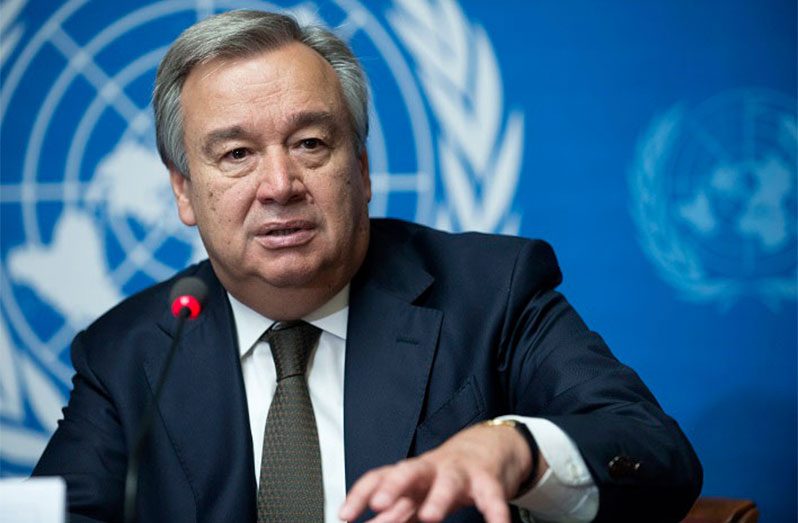AFTER being notified by the Commander in Chief of the Armed Forces, President, Dr. Irfaan Ali on Venezuela’s recent actions, the United Nations Secretary-General António Guterres, promptly echoed the call for peace and adherence to international law.
“The Secretary General strongly supports the use of solely peaceful means to settle international disputes. He further recalls that pursuant to the charter and the status of the International Court of Justice, decisions of the court are binding and he trusts that both states will duly comply with the order from the court,” Stéphane Dujarric, Spokesman for the Secretary-General stated on Wednesday.
He then went on to say: “The Secretary General notes the court’s order to both parties to refrain from any action which might aggravate or extend the dispute or make it difficult to resolve in accordance with the statute of the Court.”
The UN Secretary-General also said that he has transmitted the notice of the provisional measures ordered by the International Court of Justice (ICJ) to the UN Security Council.
On Tuesday evening, President Ali informed the nation that owing to the latest “missteps” by the Venezuelan Government, Guyana will be reporting the Bolivarian Republic’s latest actions to the UN Security Council and the ICJ.
“We will not allow our territory to be violated nor the development of our country to be stymied by this desperate threat,” Guyana’s Head of State affirmed.
He further said: “We urge President Maduro to rethink these missteps and to act and behave in accordance with the international law. All our actions and anything we do in Guyana are aimed at ensuring this region remains a region of peace. Our only ambition is for this region to remain a zone of peace…we ask for nothing more or nothing less.”
President Ali firmly stated: “President Maduro’s act is in open defiance of the ICJ order,” noting that the Venezuelan leader’s actions constitute a test to the methods of the ICJ.
The ICJ, last Friday, granted Guyana provisional measures to prevent any action by Venezuela that could lead to the annexation of Guyana’s territory.
The decision was handed down by the President of the ICJ, Justice Joan E. Donoghue, at the Peace Palace in The Hague, in The Netherlands.
The court ordered that pending the decision of the substantive case which concerns the validity of the 1899 Arbitral Award that defines the boundary between the two nations, Venezuela shall refrain from taking any action that would modify the situation that currently prevails with the territory, which Guyana administers and exercises control over.
As an additional measure, the court also ordered that “both parties refrain from any action which might aggravate or extend the dispute before the court or make it more difficult to resolve.
Owing to Venezuela’s actions, while Guyana maintains its commitment to peace, the Guyanese Head of State said the nation is taking various steps to safeguard its territorial sovereignty.
“We are here to ensure the safety of this country, the territorial integrity, the sovereignty of this country and to protect every citizen of this country,” the President told the nation.
He reiterated that the ICJ has made it crystal clear that Venezuela cannot act or take any action that will disrupt the status quo; and the status quo is that Guyana exercises governance and control of the Essequibo region.
President Ali said that Maduro’s choice of not only defying the ICJ but also issuing direct threats to companies operating in Guyana is detrimental to the peace and stability of Guyana.
As he openly defied international law, Maduro announced seven actions that his government plans to take on the Essequibo region, one of which includes an order for the creation of entities to grant licences for oil, gas and mines exploration in Guyana’s territory. Maduro has also ordered the dissemination of a redrawn map of his country that now includes Guyana’s Essequibo region.



.jpg)








